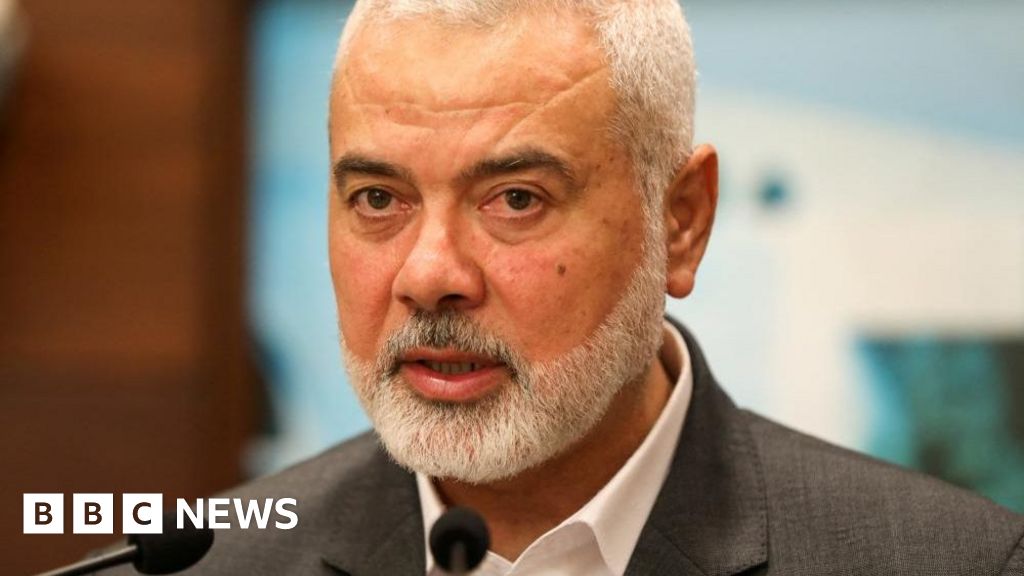The leadership of the Palestinian armed group Hamas has been left in “a state of shock” by the assassination of its political leader Ismail Haniyeh, top officials have told the BBC.
Hamas says Haniyeh, 62, was killed in an Israeli strike early on Wednesday morning in Iran. Widely considered the group’s overall leader, he has been a prominent member since the late 1980s.
As head of its political bureau based in Qatar, Haniyeh led Hamas’ outreach to regional governments and was central to its alliance with Tehran and its proxy groups across the Middle East.
He has been wanted by Israeli officials for months and the BBC understands that his protection team had recently vetoed a proposed trip to Lebanon amid security fears.
But he played little role in Hamas’ military operations and as such may have felt free to operate more openly than some of his colleagues – reflected by three trips he has taken to Iran since the 7 October attacks in Israel.
Questions over Haniyeh’s succession were already coming into view before his death. Hamas’ constitution prevents any political bureau chief serving more than two terms. A new candidate was set to be chosen in 2025.
But his death could now expedite an internal battle between competing wings of the movement.
Haniyeh himself was widely viewed by Arab diplomats as a pragmatic figure compared to others at the top of Hamas – driving the group’s political outreach to regional governments as opposed to the militant options favoured by Mohammed Deif and other leaders. Deif leads the military wing of Hamas. Earlier this month Israel said it had targeted Deif in deadly air strikes on Gaza but there has been no confirmation he was killed.
One Hamas official told the BBC: “Hamas is an idea, Hamas is an ideology. And the killing of the leader will not change Hamas, and will not make Hamas surrender or make any more concessions.”
It suggests an attempt by some leaders to dismiss the idea of any tension within the movement.
But in truth, the looming succession process could be lengthy and chaotic – defined by rivalries between those keen to reach a negotiated settlement to the war and extremist elements more closely allied with Iran.
CIA Director Bill Burns said recently that tensions have emerged among some senior Hamas commanders who have been urging the group’s leadership to show more flexibility in negotiations and to accept a hostage-ceasefire deal.
However, anger over the death of Haniyeh – and the January assassination of his deputy Saleh al-Arouri – likely puts the hardliners in pole position.
In summer 2023, one Hamas official identified Yahya Sinwar and al-Arouri as the two leading candidates to replace Haniyeh.
On Wednesday, Hamas officials told the BBC that there were now three likely candidates to put their names forward in the coming days.
The most likely contender is Sinwar. He is the group’s head in the Gaza Strip and is believed to be the mastermind behind the 7 October attacks in Israel that killed 1,200 people and sparked the ongoing conflict.
Sinwar is the key decision maker on how Hamas prosecutes the ongoing conflict and is said to be in hiding in Hamas’ tunnel network beneath Gaza.
Khaled Meshaal is another possible candidate. He is widely seen a less militant candidate than Sinwar and has previously served as chief of the political bureau. However, he has difficult relations with Iran – now the key ally and supplier of Hamas’ military wing.
During the height of the Syrian civil war, Meshaal – then living in Damascus – refused to support the Iranian-backed President Bashar al-Assad and his regime. The failure forced Hamas to relocate their political bureau to Qatar.
The final potential candidate is Zaher Jabareen, who is responsible for Palestinian prisoners in Israeli jails. He could play a key role in ongoing negotiations on prisoner swaps with Israel.
Either way, the contest is almost certain to be drawn out.
Under normal circumstances, Hamas’ political bureau is chosen by the Shura Council, whose members are elected by local council groups. The body then elects the 15-person political bureau, who choose a leader.
But members of the political bureau are scattered across the Middle East with representatives living in exile in Turkey and Qatar, making it difficult to assemble them at short notice.
Many are also on Israeli wanted lists – which may make some reluctant to travel.
Other questions continue to swirl over Hamas’ response to Haniyeh’s death.
In 2012, the death of the deputy lead of Hamas’ military wing, Ahmed al-Jaabari, saw Hamas respond with missile fire.
So how Hamas responds to Haniyeh’s death could indicate how much damage has been done to its military infrastructure after 10 months of war.
One Palestinian official also observed that his death could have a profound impact on the ongoing peace negotiations with Israel.
Haniyeh, as the acceptable face of Hamas to some in the region, was viewed as the most likely person to be able to broker a deal due to his good relations with regional diplomats.

